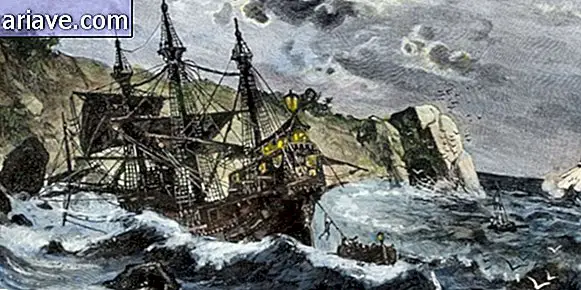Historical Drops # 34: Your weekly dose of History here at Mega
Every week, we embark on a super trip together through the ages. Not literally, of course, but to know is also to travel through places, spaces, moments and lives, without necessarily being there physically, isn't it?
Check it out: the first fact that we tell in this edition of Historical Drops, number 34, is the election of one of the Popes of the Catholic Church, in 461. What chances are we have today to understand what the world was like at that time and witness this fact? None except through historical accounts. This is why this discipline is so important!
This week we also have other more recent causes, some overshadowed by sister events - such as the sinking of the Britannica ship, which became opaque in history after the Titanic attracted all the limelight.
Come with us to know these stories and to know what was happening in the world on these dates!
November 19th
461: Elected Pope Hilarious

Little is known about what happened between the 5th and 15th centuries. It was almost a thousand years of living in darkness when it came to knowledge. And this is partly due to the Church, whose persecution and non-acceptance of truths that questioned religious dogma caused many facts to be erased from history. One of the responsible names was Pope Hilary, elected to office on November 19, 461, at the age of 51.
In his 6 years of papacy, he positioned himself as a great diplomat, but at the same time managed to perform major actions in the Catholic Church. At the First Council of Ephesus, held at the time in Asia Minor, it helped to establish different beliefs as heresy.
November 20th
1695: Zombie of the Palmares dies

Born in 1655 in Alagoas, Zumbi dos Palmares was one of the greatest, if not the greatest name of black resistance during the period of Brazilian black slavery. Captured at age 7, he was handed over as a slave, although he was born free, to a priest who named him Francis. At the age of 15, she fled her home and helped found a fugitive slave community where they could be free: Quilombo dos Palmares.
It is because of him, Zombie, the Palmares, that Brazil today considers November 20 as Black Awareness Day. Although the quilombo succumbed to the attacks of 1694, led by Domingos Jorge Velho and Bernardo Vieira de Melo, Zumbi managed to escape and lived for another year. At 40 years old, betrayed by Antonio Soares, a former fighting mate, was captured and killed.
November 21st
1916: HMHS Britannic Wreck

The sinking of the Titanic in April 1912 marked the history of mankind as perhaps the most iconic case ever known - with a little help from the movies, of course. But it was not the only large vessel lost to the ocean floor in the last century.
In November 1916, HMSM Britannic took leave of the surface and sank into the Aegean Sea, less than 3 years after its launch and 4 and a half years after the Titanic.
The White Star Line passenger ship, first named from Gigantic, was a transatlantic built to be the largest, safest, and most luxurious in its class. Remember anyone? Yeah! However, ordered by the British Royal Navy in 1915 because of World War I, it was blown up by entire defects and sank just over an hour later.
At 269 meters long, the Britannic was the largest sunken ship in the history of the world - that's not the Titanic. Fortunately, the crew realized what was happening quickly and was able to remove most of the people on board, this time properly occupying the boats. Of the 1, 125 individuals on the boat, 30 lost their lives and 45 were injured, but the vast majority managed to save themselves.
November 22
1842: First home delivery post office opened

It was in the Santa Cruz neighborhood of Rio de Janeiro that the country saw its first post office open for the first time in national history by adopting the home delivery system. It was in 1842, during the rule of Dom Pedro II.
As well as Banco do Brasil and the National Library, several other advances and innovations from the time of the monarchy happened in the country thanks to the coming of the Portuguese Royal Family to the ocean side.
On November 29, a few days later, the emperor decreed the advance payment for postage with the postage stamp institution. Prior to that, the postal service existed, but its operations since its founding in 1663 did not include the delivery of letters and parcels at home.
November 23
1913: Institution of the Electrical Engineer's Day
Do you know when the day of the Electrical Engineer began in Brazil? The date itself was instituted on October 29, 2009, in honor and celebration of the inauguration of the Itajubá Electrotechnical Institute, which took place in 1913.
Today Itajubá Federal University, in Minas Gerais, is considered the first national technological university and the tenth engineering school in Brazil. The dedication to the area of Electrical Engineering encouraged the choice of date to celebrate the profession as well.
November 24th
1631: Olinda is set on fire by the Dutch

Visiting the cities of Olinda and Recife, Pernambuco, means finding a number of references to the period in which the region was greatly influenced by Dutch culture, since it was under the domination of the country.
Valuable for its strategic location, the city populated in 1535 was, for decades, the center of Pernambuco's development. Today glued to Recife, Olinda conserves dozens of properties considered Brazilian cultural heritage.
However, in 1631, the city's type of development succeeded in attracting the negative attraction of the Dutch. With an eye on sugar cane, they sought mastery of the region and began to burn much of the city's history.
Taken to the ruins, the entire city, which at that time had 2, 000 inhabitants, was abandoned and only received government attention in 1654, with the expulsion of the Dutch by the Portuguese. In 1657 Olinda became the seat of the captaincy's government again and was rebuilt.
November 25th
1999: UN establishes Nonviolence Day against Women

The 1990s were crucial to women's struggle for the right not to suffer violence solely because they were women. Although feminism itself dates back long before that, in that decade the movement's agenda turned strongly to the fight against domestic violence.
On November 25, 1999, the United Nations Organization officialized International Day of Non-Violence against Women to commemorate the murder of sisters Minerva, Patria and María Teresa Mirabal, whose deaths were commissioned by Dominican dictator Rafael Leónidas Trujillo.
In Brazil, this agenda became stronger in the following decade, with the enactment of the Maria da Penha Law in 2006.
***
Do you know the Mega Curioso newsletter? Weekly, we produce exclusive content for lovers of the biggest curiosities and bizarres of this big world! Register your email and do not miss this way to keep in touch!











